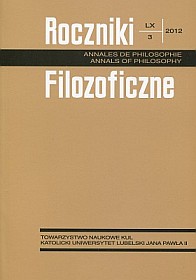Ogólna charakterystyka idei w wykładni Malebranche’a
Abstrakt
According to Malebranche only God can cause the interaction between mind and body, two substances having totally different characteristics. Descartes claims that in the cognition we need ideas’ mediation. While we can get to know spiritual ego in a clear manner, we know the material world only in an imperfect way because it is located outside our mind. The originality of Malebranche’s philosophy consists in the fact that he appreciates the cognition of the material world. We mustn’t forget, however, to follow our reason as well as clear and distinct ideas, not blurred sensations. The French philosopher deprives senses and imagination of their cognitive value in favour of intellectual cognition. Information received through our senses serves the body to sustain life. Imagination is in many cases the source of mistakes. It is only pure understanding that gives us the possibility for objective cognition based on eternal and unchangeable archetypes.
We cannot get to know God’s immensity nor God’s attributes because of our mental limitations. Still, in the most perfect way we can apprehend ideal extension which constitutes this part of God’s substance that contains clear and distinct ideas of bodies. Archetypes of objects contain all properties of objects. Looking at the created world, we see them in different ways depending if we get to know them only intellectually or receive the movements of nerves’ fibres as well. But we can’t see God by an intermediary of an idea because nothing finite can represent infinity.
Bibliografia
Arnauld A.: Des vraies et des fausses idées, Paris: Vrin 2011.
Św. Augustyn: Państwo Boże, przeł. W. Kubicki, Kęty: Antyk 1998.
Bridet L.: La théorie de la connaissance dans la philosophie de Malebranche, Paris: M. Rivière 1929.
Chmaj L.: Okazjonalizm, Warszawa: Piotr Pyz i S-ka 1937.
Chmaj L.: Pojęcie przyczynowości w filozofii Kartezjusza, ,,Przegląd Filozoficzny” 40 (1937), s. 120-132.
Czerkawski J.: Byt i nieskończoność w filozofii N. Malebranche’a (część pierwsza). „Roczniki Filozoficzne” 39-40 (1991-1992), z. 1, s. 255-270.
Czerkawski J.: Byt i nieskończoność w filozofii N. Malebranche’a (część druga), „Roczniki Filozoficzne” 41 (1993), z. 1, s. 103-124.
Czerkawski J.: Malebranche, [w:] Powszechna Encyklopedia Filozofii, t. 7, red. A. Maryniarczyk, Lublin: PTTA 2006, s. 747-751.
Czerkawski J.: Rola ‘cogito’ w filozofii N. Malebranche’a, „Archiwum Historii Filozofii i Myśli Społecznej”, 38 (1993), s. 129-138.
Czerkawski J.: Zagadnienie istnienia świata materialnego w filozofii N. Malebranche’a, Roczniki Filozoficzne” 50 (2002), z. 1, s. 73-82.
Czerkawski J.: Zagadnienie przyczynowości w tradycji pokartezjańskiej, [w:] Zadania współczesnej metafizyki. Analogia w filozofii, red. A. Maryniarczyk, Lublin: 2005, s. 309-324.
Davies A. E.: Some Factors of Malebranche’s Theory of Knowledge, ,,The Philosophical Review” 33 (1924), No. 5.
Descartes R.: Medytacje o pierwszej filozofii. przeł. M. i K. Ajdukiewiczowie. Kęty: Antyk 2001.
Descartes R.: Zasady filozofii, przeł. I. Dąmbska, Warszawa: PWN 1960.
Gaonach J.-M.: La théorie des idées dans la philosophie de Malebranche, Brest: Rue du Chateau 1908.
Gouhier H.: La philosophie de Malebranche, Paris: Vrin 1926.
Janeczek S., Stępień A.B.: Idea, [w:] Powszechna Encyklopedia Filozofii, t. 3, red. A. Maryniarczyk Lublin: PTTA 2002, s. 717-719.
Kiereś B.: Idee jednostkowe jako racje poznania rzeczy realnych, [w:] Św. Tomasz z Akwinu, De ideis – O ideach. Dysputy problemowe „O ideach”, „O wiedzy boga”, red. A. Maryniarczyk, Lublin: RW KUL 2006.
Kopania J.: Funkcje poznawcze Descartesa teorii idei, Białystok: Dział Wydawnictw Filii UW 1988.
Kopania J.: Nicolasa Malebranche’a widzenie w Bogu, [w:] N. Malebranche, Medytacje chrześcijańskie i metafizyczne, przeł. M. Frankiewicz, Kraków: Znak 2002, s. 7-25.
Malebranche N.: Dialogi o metafizyce i religii, przeł. P. Rak, Kęty: Antyk 2003.
Malebranche N.: Eclaircissements, [w:] tenże, Œuvres complètes, Paris: Sapia 1837.
Malebranche N.: Entretiens métaphysiques, Paris: Charpentier 1842.
Malebranche N.: Medytacje chrześcijańskie i metafizyczne, przeł. M. Frankiewicz, Kraków: Znak 2002.
Malebranche N.: Poszukiwanie prawdy, t. 1-2, przeł. M. Frankiewicz, Warszawa: IFiS PAN 2011.
Malebranche N.: Recherche de la Vérité, Paris: Charpentier 1842.
Malebranche N.: Traktat o moralności, przeł. P. Rak, Kęty: Antyk 2006.
Moreau D.: Introduction, [w:] A. Arnauld, Des vraies et des fausses idées, Paris: Vrin 2011.
Nadler S.: Malebranche and Ideas, Oxford: Oxford University Press 1992.
Nadler S.: Malebranche on Causation, [w:] The Cambridge Companion to Malebranche, red. S. Nadler, Cambridge: Cambridge University Press 2006, s. 112-138.
Pawlikowski T.: Augustyńska teoria idei, [w:] Św. Tomasz z Akwinu, De ideis – O ideach. Dysputy problemowe „O ideach”, „O wiedzy boga”, red. A. Maryniarczyk, Lublin: RW KUL 2006.
Paź B.: Epistemologiczne założenia ontologii Christiana Wolffa, Wrocław: Wyd. UW 2002.
Paź B.: Reprezentacjonizm, [w:] Powszechna Encyklopedia Filozofii, t. 8, red. A. Maryniarczyk, Lublin: PTTA 2007, s. 755-760.
Petit Robert, red. A. Rey, J. Rey-Debove, Paris: le Robert 1992.
Platon: Fedon, przeł. W. Witwicki, [w:] tenże, Dialogi, t. 1, Kęty: Antyk 1999.
Platon: Timajos, przeł. W. Witwicki, [w:] tenże, Dialogi, t. 2, Kęty Antyk 1999.
Powszechna Encyklopedia Filozofii, t. 1-10, red. A. Maryniarczyk, Lublin: PTTA 2000-2009.
Pyle A.: Malebranche, New York: Routledge 2003.
The Cambridge Companion to Malebranche, red. S. Nadler, Cambridge: Cambridge University Press 2006.
Twardowski K.: Idea i percepcja. Z badań nad Kartezjuszem, przeł. E. Paczkowska-Łagowska, „Archiwum Historii Filozofii i Myśli Społecznej” 22 (1976).
Watson R.A: The Downfall of Cartesianism 1673-1712, The Hague: Martinus Nijhoff 1966.
Copyright (c) 2012 Roczniki Filozoficzne

Utwór dostępny jest na licencji Creative Commons Uznanie autorstwa – Użycie niekomercyjne – Bez utworów zależnych 4.0 Międzynarodowe.





